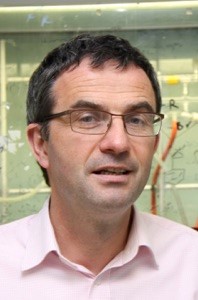Two major grants for St Andrews
Two top research grants to investigate the heating of the Sun’s atmosphere and to develop a biotechnology for fluorochemicals production have been awarded to academics at the University of St Andrews by a major national funding body.
Professor Ineke De Moortel, of the School of Mathematics and Statistics, and Professor David O’Hagan, of the School of Chemistry at the University, have been recognised with Research Project Grants from the Leverhulme Trust.

Professor De Moortel has been awarded £459,268 for a five-year project called ‘Joining up an Unprecedented View of our Sun’ to start in October this year.
Professor De Moortel’s project follows on from the successful launch of Solar Orbiter in February 2020, a European Space Agency (ESA) mission which will take the closest ever images of our Sun.
Her project will look at how remote-sensing and in-situ observations of the Sun’s outer atmosphere can be combined. Together with large-scale computational models these observations can then be used to investigate why the temperature in the solar atmosphere is orders of magnitude hotter than its surface.
Professor De Moortel said: “This grant from the Leverhulme Trust will give us an opportunity to really exploit the data from the Solar Orbiter mission and create computational models that directly use input from the observation.”

Professor O’Hagan has been awarded £185,215 for a three-year ground-breaking project called ‘Identification of a fluorination enzyme involved in nucleocidin biosynthesis’ to begin in May this year.
Nucleocidin is an antibiotic produced by fermentation of a soil bacterium (Streptomyces calvus) and notably is an example of a rare molecule from nature that contains a fluorine atom.
It follows that there has to be an enzyme in the bacterium that combines carbon with fluorine. The project aims to try and discover this enzyme which will be only the second such enzyme known, the first of which was discovered in St Andrews in 2002. If the genetic basis of such an enzyme can be established, prospects emerge for a biotechnology to make fluorine compounds.
Fluorine chemicals are a major sector of the chemicals industry, but processes of production are hazardous and toxic, thus a biotechnology to make fluorine compounds would offer sustainable solutions.
Professor O’Hagan said: “I am delighted to receive this grant from the Leverhulme Trust, and particularly as it will enable Xuan Feng, who has just completed his PhD in St Andrews, to continue his work at postdoctoral level on this exciting project.”
The Leverhulme Trust was established by the Will of William Hesketh Lever, the founder of Lever Brothers. Since 1925 the Trust has provided grants and scholarships for research and education. Today it is one of the largest all-subject providers of research funding in the UK, distributing approximately £100m a year. For more information about the Trust, visit the website or follow the Trust on Twitter @LeverhulmeTrust.
Issued by the University of St Andrews Communications Office.